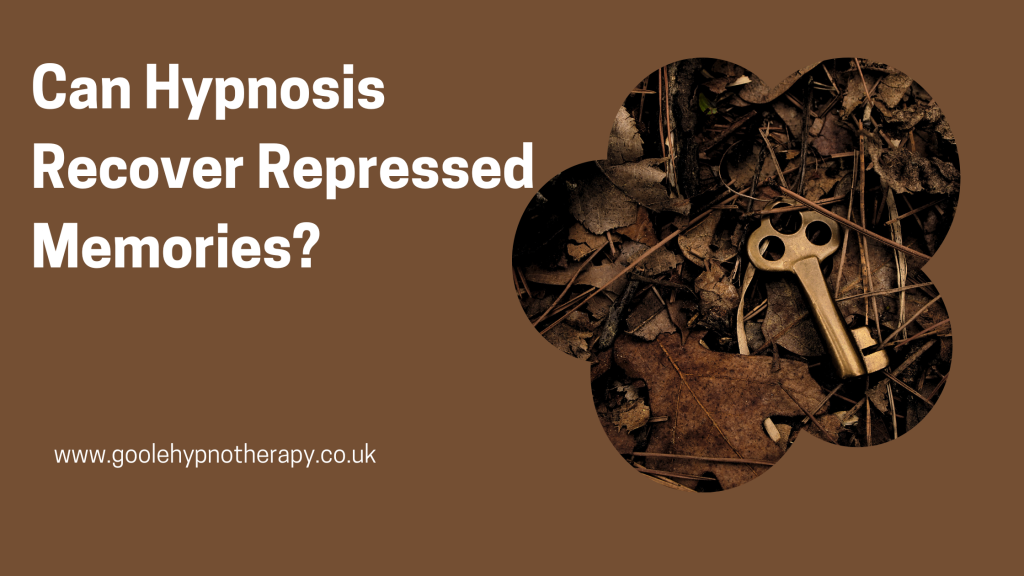Hypnosis, a tool often associated with stage performances and magic tricks, has found its place in the realm of therapy, particularly in the field of memory recovery. The question, “Can hypnosis recover repressed memories?”, is one that elicits diverse responses across the scientific and therapeutic communities. Through this blog post, we at Goole Hypnotherapy, aim to delve into the depths of this complex issue. We will explore the science, controversy, ethics, and case studies surrounding the use of hypnosis in memory recovery. Our intent is to equip you with a balanced understanding of the topic, enabling you to form your own informed opinion.
The Science Behind Hypnosis and Memory
The science of hypnosis and memory, especially in relation to repressed memories from trauma, is a vast and evolving field. Hypnosis entails a state of focused attention and increased suggestibility, which can potentially facilitate the retrieval of lost memories.
Hypnosis and the Unconscious Mind
Under hypnosis, individuals can tap into the deeper recesses of their unconscious mind, a realm often unexplored in our conscious, waking state. The unconscious mind is believed to serve as a storehouse of past experiences and emotions, which could include repressed memories associated with trauma.
Trauma and Repressed Memories
Trauma can often lead to the repression of memories as a defence mechanism. The mind, in its attempt to protect itself, pushes these distressing memories into the unconscious, rendering them ‘forgotten’ or ‘lost memories’. Hypnosis has been proposed as a tool to access these repressed memories, bringing them to the conscious awareness for processing and healing.
Hypnosis and Retrieval of Lost Memories
In the application of hypnosis for memory retrieval, there are varying perspectives. Some believe that under hypnosis, the mind can reconstruct past experiences with remarkable clarity, including those which have been repressed or forgotten. Others, however, caution that hypnosis may also pave the way for the creation of false memories, as the state of heightened suggestibility could potentially lead to the incorporation of suggestions or leading questions into one’s memory. In such instances, distinguishing between true memories and false constructs could prove challenging.
Despite these complexities, the exploration of hypnosis in memory recovery, particularly in relation to trauma, continues to be a compelling field of study. It is an area that necessitates careful navigation, balancing the potential therapeutic benefits with the ethical implications of memory retrieval.
Understanding Memory: How Do We Remember?
Memory is often perceived as an infallible archive of our past, a stronghold of every experience, emotion, and learned detail. However, scientific research suggests otherwise. The act of remembering, in reality, is quite malleable and subject to alteration. Each time we retrieve a memory, it becomes susceptible to change, coloured by our present emotions, beliefs, and even external influences. This dynamic nature of memory makes the psychological and neurological aspects of its retrieval an intriguing subject of study.

The Conscious and Subconscious: Storing and Accessing Memories
From the perspective of cognitive psychology, memory is not located in one particular place in the brain, but is instead a brain-wide process. The conscious mind, or what we refer to as working memory, is responsible for storing immediate experiences and short-term information. It functions like a temporary and ever-changing scratchpad where we process our immediate sensory input and thoughts.
The Role of Subconscious in Memory
On the other hand, the subconscious mind serves as a vast reservoir of long-term memories, emotions, and patterns of behaviour. It is in this deeper level that our repressed or forgotten memories lie dormant, awaiting possible retrieval. These memories are not lost, but simply ‘inactive’, their neural pathways having faded over time due to lack of access or use.
Neural Pathways and Memory Reinforcement
When we practise or repeat something we have learnt, be it a skill, an experience, or a piece of information, we are essentially strengthening the neural pathways associated with that memory. This is known as memory consolidation, a process through which short-term memories are made into long-term ones. Continual repetition or rehearsal reinforces these neural circuits, making the memory more durable and less prone to forgetting. It demonstrates the brain’s astounding capacity for neuroplasticity, its ability to change and adapt in response to experiences.
The Role of Hypnotherapy in Memory Recovery
Hypnotherapy, particularly practices such as Goole Hypnotherapy, can play a significant role in the process of memory recovery. This method involves guiding a person into a deeply relaxed state, referred to as hypnosis, where the conscious mind is quieted to allow for easier access to the subconscious. In this state, the hypnotherapist can help navigate the wealth of long-term memories stored in the subconscious, potentially enabling the individual to recall memories previously deemed inaccessible.
Hypnotherapist: The Guide to Subconscious
The role of a hypnotherapist is akin to a guide, gently leading the individual into the realm of the subconscious. With a trained and experienced hypnotherapist, individuals can safely explore their memories under the state of hypnosis, even those that might be associated with traumatic experiences.
Hypnosis to Help Recall Memories
The state of relaxation achieved through hypnosis can help reduce the influence of the conscious mind, which often acts as a barrier to the recall of inaccessible or repressed memories. This hypnosis-induced state is characterised by heightened focus and increased suggestibility, allowing memories stored in the subconscious to surface.
Memories Recovered: A Caveat
It’s important to note that while hypnosis can facilitate the recovery of memories, it is not a magic wand that can retrieve every forgotten event. The exact efficacy of hypnosis in memory recovery varies from person to person. Furthermore, the potential for false memories to be created is a serious consideration and has led to debates within the scientific community about the ethical use of hypnosis in such contexts.
Using Hypnosis to Recover Memories of Childhood Abuse
In the context of childhood trauma, the subconscious mind often employs memory repression as a coping mechanism designed to shield us from emotional distress. Hypnotherapy has emerged as a potential tool to access and address these repressed childhood memories. This therapeutic approach can serve as a gateway to memories locked away in the recesses of the subconscious, memories that we’re otherwise unable to remember due to the protective barriers erected by our mind.
Evoking Traumatic Memories During Hypnotherapy
During hypnotherapy, a state of heightened suggestibility can enable the recall of traumatic memories previously inaccessible due to their distressing nature. By gently guiding the patient through their subconscious landscape, a skilled hypnotherapist can help them confront and process these painful memories in a safe and controlled environment.
The Role of Traumatic Events in Memory Repression
Traumatic events, especially those occurring in childhood, can be deeply ingrained in our subconscious minds, contributing to a range of mental health issues later in life. The subconscious mind, in a bid to protect us from psychological harm, can repress the memories of these events, burying them under layers of forgetfulness and denial.
Processing Traumatic Childhood Memories
Repressing memories can provide temporary relief, yet the unresolved emotions associated with traumatic childhood events can continue to exert a subtle yet profound influence on our behaviour and emotional health. Through hypnotherapy, these repressed memories can be brought to consciousness and processed, facilitating emotional healing and resolution.
Controversies Surrounding the Use of Hypnosis for Memory Retrieval
In the context of childhood trauma, the subconscious mind often employs memory repression as a coping mechanism designed to shield us from emotional distress. Hypnotherapy has emerged as a potential tool to access and address these repressed childhood memories. This therapeutic approach can serve as a gateway to memories locked away in the recesses of the subconscious, memories that we’re otherwise unable to remember due to the protective barriers erected by our mind.
Evoking Traumatic Memories During Hypnotherapy
During hypnotherapy, a state of heightened suggestibility can enable the recall of traumatic memories previously inaccessible due to their distressing nature. By gently guiding the patient through their subconscious landscape, a skilled hypnotherapist can help them confront and process these painful memories in a safe and controlled environment.
The Role of Traumatic Events in Memory Repression
Traumatic events, especially those occurring in childhood, can be deeply ingrained in our subconscious minds, contributing to a range of mental health issues later in life. The subconscious mind, in a bid to protect us from psychological harm, can repress the memories of these events, burying them under layers of forgetfulness and denial.
Processing Traumatic Childhood Memories
Repressing memories can provide temporary relief, yet the unresolved emotions associated with traumatic childhood events can continue to exert a subtle yet profound influence on our behaviour and emotional health. Through hypnotherapy, these repressed memories can be brought to consciousness and processed, facilitating emotional healing and resolution.
Ethical Considerations in Hypnotherapy for Recovering Memories
The ethical aspects of using hypnotherapy to recover memories, specifically those pertaining to memories of childhood abuse, are complex and multifaceted. The process of revealing long-suppressed abuse memories using hypnosis raises concerns about the potential manipulation of the patient’s recall and the risk of implanting false memories.
The Risk of Implanting False Memories
The heightened suggestibility inherent in hypnosis has led to concerns about the possibility of therapists unintentionally implanting false memories of abuse in their patients’ minds. This could occur when a therapist suggests or implies that certain events may have happened, causing highly suggestive patients to create memories that align with these suggestions.
The Consequences of Uncovering Suppressed Abuse Memories
Uncovering suppressed memories of past abuse can lead to significant distress and emotional turmoil. Ethically, therapists must weigh the potential harm of revealing such traumatic memories against the potential benefits of processing and healing from past trauma.
Ensuring Informed Consent
In light of these issues, gaining informed consent becomes paramount. Patients must be made aware of the potential risks, including the possibility of false memory implantation and the emotional upheaval of revealing traumatic abuse memories. Only then can they make an informed decision about their treatment.
Case Studies: Hypnosis and Memory Recall in Practice
Numerous studies have been conducted to understand the effects of hypnosis on memory recall. Some research suggests that hypnosis can enhance one’s ability to recall memories, particularly in individuals with a high level of hypnotic suggestibility. However, other studies indicate that hypnosis may also increase the likelihood of creating false memories.
Case Study 1: Paul Ingram Case
The Paul Ingram case is a notable example involving hypnosis and the creation of false memories. Ingram, accused of sexual abuse by his daughters, initially denied any allegations. However, after numerous hypnosis sessions, he confessed to the crimes, later retracting his confession, asserting the memories were false and implanted. This case generated significant controversy and spurred intense debate regarding the use of hypnosis in the context of legal investigations and therapeutic settings. More about this case can be read at The New Yorker.
Case Study 2: The Hillside Strangler
A contrary example illustrating potential benefits of hypnosis in memory retrieval is the case of the Hillside Strangler. In this case, a witness’s hypnotically-retrieved memory led to the successful identification and conviction of the perpetrators. This case is often cited when discussing the potential value of hypnosis in investigative processes. Details about the case are available at The Guardian.
These diverse case studies highlight the complex and controversial nature of using hypnosis for memory recovery, further emphasising the need for careful ethical consideration and informed consent in such practices.

The Future of Hypnosis in Memory Recovery: A Balanced View
In conclusion, hypnotherapy can serve as a powerful tool in the recovery of previously forgotten or suppressed memories, potentially providing invaluable insights into the complexities of the human mind. However, it is crucial to approach this technique with caution, as memories may be inaccurately recalled or even falsely implanted, as evidenced in the Paul Ingram case. Therefore, seeking guidance from an experienced, ethical hypnotist is of paramount importance when considering hypnosis for memory regression. This ensures a balanced approach, protecting the individual from potential harmful effects while exploring the hidden recesses of the mind. The science of hypnosis is a complex, continually evolving field, and its future in memory recovery is both promising and contentious.
How to Find a Hypnotist to Help Recover Repressed Memories
Finding a suitable hypnotherapist to help recover repressed memories can be a daunting task, considering the sensitive nature of the process. First and foremost, it is crucial to find a hypnotherapist with extensive experience and training in the field of memory recovery. Professional qualifications, certifications, and a proven track record can serve as indicators of their expertise.
One such reputable establishment is Goole Hypnotherapy. With a team of highly trained, ethical hypnotherapist, Goole Hypnotherapy is dedicated to assisting individuals in safely exploring their subconscious to recover and understand repressed memories. The hypnotherapists at Goole place a high emphasis on client safety and comfort, ensuring a supportive, non-judgmental environment is maintained throughout the process.
Moreover, Goole Hypnotherapy offers both face-to-face and online sessions, providing flexibility for those who may be restricted by geographical location or personal circumstances. The option for online sessions allows you to partake in this journey of self-discovery from the comfort of your own home, whilst still receiving the full benefits of the therapy.
It is essential to remember that the process of recovering repressed memories through hypnosis is a delicate one, and should only be undertaken with the guidance of a professional. With its dedication to ethical, safe practices and vast experience in the field, Goole Hypnotherapy emerges as a viable choice for those seeking assistance in this journey.
Ready to Uncover Hidden Memories Safely?
Taking the first step in this journey towards recovering your repressed memories is as simple as booking a free initial consultation with Goole Hypnotherapy. This no-obligation meet allows you to discuss your needs and concerns with a professional hypnotherapist, helping to ease any apprehensions you may hold. Remember, you are not alone in this journey, and the team at Goole Hypnotherapy is here to guide and support you every step of the way. So why wait? It’s time to uncover, understand, and heal. Book your free initial consultation today.

Leave a Reply